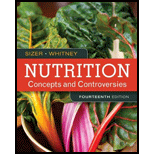
Nutrition: Concepts and Controversies - Standalone book (MindTap Course List)
14th Edition
ISBN: 9781305627994
Author: Frances Sizer, Ellie Whitney
Publisher: Brooks Cole
expand_more
expand_more
format_list_bulleted
Question
Chapter 9, Problem 3SC
Summary Introduction
Introduction:
BMR or basal metabolic rate is defined as the rate of expanded energy per unit time by an endothermic animal at the state of rest. It shows the energy amount per unit time, which is used by a person for the proper functioning of the body at rest. Factors affecting BMR include body size, weight, muscle mass, body temperature, and gender. Thyroid hormone is responsible for regulation and maintenance of BMR.
Expert Solution & Answer
Trending nowThis is a popular solution!

Chapter 9 Solutions
Nutrition: Concepts and Controversies - Standalone book (MindTap Course List)
Ch. 9 - Prob. 1RQCh. 9 - Prob. 2RQCh. 9 - Prob. 3RQCh. 9 - Prob. 1CTCh. 9 - Prob. 2CTCh. 9 - Prob. 1SCCh. 9 - Prob. 2SCCh. 9 - Prob. 3SCCh. 9 - Prob. 4SCCh. 9 - Prob. 5SC
Ch. 9 - Prob. 6SCCh. 9 - Prob. 7SCCh. 9 - Prob. 8SCCh. 9 - When the brain receives signals that enough food...Ch. 9 - Prob. 10SCCh. 9 - Prob. 11SCCh. 9 - Prob. 12SCCh. 9 - Prob. 13SCCh. 9 - Prob. 14SCCh. 9 - Prob. 15SCCh. 9 - Prob. 16SCCh. 9 - Prob. 17SCCh. 9 - Prob. 18SCCh. 9 - Prob. 19SCCh. 9 - Prob. 20SCCh. 9 - Prob. 21SC
Knowledge Booster
Similar questions
- The preferred energy sources for the body are ________.arrow_forwardFigure 37.11 Pancreatic tumors may cause excess secretion of glucagon. Type I diabetes results from the failure of the pancreas to produce insulin. Which of the following statement about these two conditions is true? A pancreatic tumor and type I diabetes will have the opposite effects on blood sugar levels. A pancreatic tumor and type I diabetes will both cause hyperglycemia. A pancreatic tumor and type I diabetes will both cause hypoglycemia. Both pancreatic tumors and type I diabetes result in the inability of cells to take up glucose.arrow_forwardFigure 16.14 Goiter, a disease caused by iodine deficiency, results in the inability of the thyroid gland to form T3 and T4 . The body typically attempts to compensate by producing greater amounts of TSH. Which of the following symptoms would you expect goiter to cause? a. Hypothyroidism, resulting in weight gain, cold sensitivity, and reduced mental activity. b. Hyperthyroidism, resulting in weight loss, profuse sweating and increased heart rate. C. Hyperthyroidism, resulting in weight gain, cold sensitivity, and reduced mental activity. d. Hypothyroidism, resulting in weight loss, profuse sweating and increased heart rate.arrow_forward
- Which of the following statements is not true? a. Essential nutrients can be synthesized by the body. b. Vitamins are required in small quantities for bodily function. c. Some amino acids can be synthesized by the body, while others need to be obtained from diet. d. Vitamins come in two categories: fat-soluble and water-soluble.arrow_forwardThe hormone insulin enhances the carrier-mediated transport of glucose into most of the bodys cells but not into brain cells. The uptake of glucose from the blood by neurons does not depend on insulin. Knowing the brains need for a continuous supply of blood-borne glucose, predict the effect that insulin excess would have on the brain.arrow_forwardThe hormone insulin enhances the transport of glucose (sugar) from the blood into most body cells. Its secretion is controlled by a negative-feedback system between the concentration of glucose in the blood and the insulin-secreting cells. Therefore, which of the following statements is correct? A decrease in blood glucose concentration stimulates insulin secretion, which in turn further towers blood glucose concentration. An increase in blood glucose concentration stimulates insulin secretion, which in turn lowers blood glucose concentration. A decrease in blood glucose concentration stimulates insulin secretion, which in turn increases blood glucose concentration. An increase in blood glucose concentration stimulates insulin secretion, which in turn further increases blood glucose concentration. None of the preceding is correct.arrow_forward
arrow_back_ios
arrow_forward_ios
Recommended textbooks for you
 Human Physiology: From Cells to Systems (MindTap ...BiologyISBN:9781285866932Author:Lauralee SherwoodPublisher:Cengage Learning
Human Physiology: From Cells to Systems (MindTap ...BiologyISBN:9781285866932Author:Lauralee SherwoodPublisher:Cengage Learning- Essentials of Pharmacology for Health ProfessionsNursingISBN:9781305441620Author:WOODROWPublisher:CengageLifetime Physical Fitness & WellnessHealth & NutritionISBN:9781337677509Author:HOEGERPublisher:Cengage


Human Physiology: From Cells to Systems (MindTap ...
Biology
ISBN:9781285866932
Author:Lauralee Sherwood
Publisher:Cengage Learning


Essentials of Pharmacology for Health Professions
Nursing
ISBN:9781305441620
Author:WOODROW
Publisher:Cengage

Lifetime Physical Fitness & Wellness
Health & Nutrition
ISBN:9781337677509
Author:HOEGER
Publisher:Cengage
